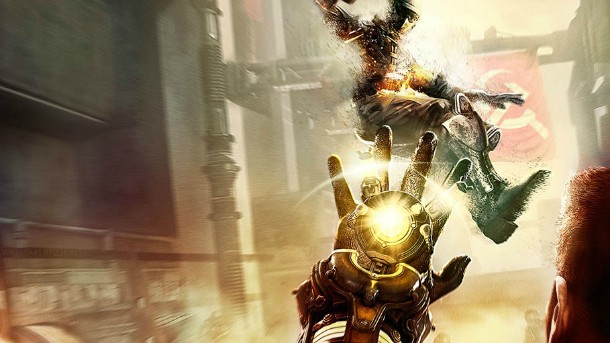Please support Game Informer. Print magazine subscriptions are less than $2 per issue
Cheating The Hourglass: Time Travel In Video Games

When I was 13, one of my absolute favorite games was Prince of Persia: Sands of Time.
Sands of Time absorbed my life when I first received it. I had never played the original, but the PlayStation 2 release quickly became my go-to option when I got home from school every day. Any whippersnappers reading may not realize what a giant deal that is, because middle-schoolers don’t have Toonami to come home to anymore. Anything that could pull me away from my obsession with Rurouni Kenshin and Yu Yu Hakusho was rare.
Anyway, what really drew me into Sands of Time was its key gameplay mechanic: time travel. If an enemy was about to finish me off or I couldn’t make a jump, no problem. The nifty Dagger of Time allows the player to rewind undesirable events and give it another go.
Remembering my fondness for this classic inspired me to look into other uses of time as an ally, foe, or even a pawn in video games.

Time Is On My Side
In a similar fashion to the aforementioned Prince of Persia series, there are titles that use time as an ally.
The strongest example I have found is in the indie hit Braid. Tim is able to rewind time as needed to solve puzzles and undo deaths in his quest to save a princess. Other time manipulation abilities are acquired throughout the different worlds and are woven into the story itself. Particularly in the last world, the use of time factors into the story. Time moves backwards throughout the level, and only by using Tim’s powers to set time forward can he make his way to the princess.
Another clever use of time can be found in Double Fine’s The Cave. The basic premise of the game is that seven characters must make their way through a magical, talking cave to discover the dark side to their personalities. In a way, the story is just as much about each of them as it is about The Cave as a character. One of the levels involves a puzzle that requires the player to switch between past, present, and future. The character known as the Time Traveler feels cheated out of not receiving the “Best Employee of All Time” award, as it goes to a guy who’s a real jerk. She must go back a few millennia to get rid of the caveman whose descendants include the man who wrongly received the award. The grisly way in which the Time Traveler solves her dilemma is noticed by the The Cave, who remarks that killing an entire family line can’t be undone – unless, of course, the Time Traveler goes back in time again to undo her actions.
“Time machines really take the fun out of trying to teach hard lessons about consequences,” The Cave laments.
It’s a valid point. What’s the point of considering a consequence when it can always be put right again? Thankfully, this a parenting issue not likely to arise until long after I have kids.

Let’s Do The Time Warp Again
Creating a perpetual in-game time loop for players to figure out can be exasperatingly “fun.”
Ephemeral Fantasia is probably a title most of you aren’t familiar with, simply because the reviews were not exactly glowing when the game was released in 2001. Basically, you play as a mute magician whose guitar (aptly named Mous) speaks for him. It gets weirder.
Your objective is to figure out how to break the curse of an island stuck in a repeating time loop cast by an evil villain.
I can distinctly recall staying up late at night with a friend trying to figure out the patterns behind the five-day time loop. She and I would try to discern the townspeople’s schedule obsessively. How do we recruit that weird geezer? How do we not get lost when venturing out of town? How in the world do you pronounce Xelpherpolis?
What could have been a cool feature was lost in the frustration of trying to figure out how to progress – which was nearly impossible to do without a guide. Plus, seeing the same events occur again and again gets old pretty fast.
A more noteworthy example of this is found in Legend of Zelda: Majora’s Mask. Majora’s Mask came out a few months before Ephemeral Fantasia and used a similar gameplay mechanic. In the three-day loop, the third day spells disaster for the world’s existence, as the moon will crash when the clock strikes zero. Link must continue to reset the cycle before the end of day three to prevent this from happening. Plus, the moon looks like something purposefully designed to terrify young children, so it's definitely not something you want getting too close.
My general feeling toward time loops is that they are better left in the world of fiction. Time is generally a foe in these situations where it is ever-repeating – while predictable, it’s still a pain to deal with.
Click ahead to page two to see more uses of time looping madness in games.

The Times They Are a-Changin'
Changing the past is an issue that boggles the mind— particularly the way it has been used in games. A spoilerific example can be found in the 2010 title Singularity. If you plan on playing this game you may want to skip to the next section to avoid anything that could hinder your experience.
In Singularity, Renko is ported from present day to 1955, where he saves a man from a fire in spite of the protests from a different person telling him he should not save the man from the fire.
Turns out, the man Renko saves is an evil scientist by the name of Demichev. Back in the present, Demichev has taken over the world. As a double-punch, Renko is not only the guy who saved Demichev but he is also the man who was telling him to not save Demichev in the past. Still with me?
Therefore, Renko obviously can’t go back and tell himself not to save Demichev, as that tactic clearly didn’t work the first time around. Now, Renko is faced with the option of going back in time to kill the version of himself that saves Demichev.
What exactly happens to the present version of yourself if you kill yourself in the past? While it’s an interesting concept to explore, it can be difficult to fully understand. The ramifications of even small changes to the past can be far-reaching, much like the butterfly effect theory.

Parallel Universe
Several games have acknowledged alternate timelines created for the protagonist to agonize over.
The time manipulation in Chrono Cross is quite different from the prequel, Chrono Trigger. Instead of traveling to different eras, the characters of Chrono Cross are able to travel to a different dimension at the same point in time. This creates an awkward situation for Serge. After being sent into a parallel time where he had drowned as a child, he is able to see how time moves on without his existence in the second dimension.
Radiant Historia makes a similar use of time. Players can alternate between separate universes in order to alter history and reach multiple conclusions to the game. What’s the true meaning of “historia” when it can be altered at any time?
While used quite a bit in other forms of fiction like novels and films, I feel that the parallel universe concept could actually be used more often in games and offer diverse possibilities for gameplay in a way that make the trope feel fresh rather than tired.

This Time Tomorrow
A final time-manipulation game type to consider is possibly the most classic use of the trope.
The ability to travel between time periods at will was used memorably in Chrono Trigger. Traveling through seven different time periods, the player is able to recruit various members to Crono’s party. While it is the most standard use of time travel, it is also arguably one of the most beloved time-travel video games of all time.
Whether or not we will be able to time travel within our own lifetimes is a concept that seems so unlikely that it is better left to pulp fiction and sci-fi movies.
But in the down time until a DeLorean prototype is made, I’ll be living out my time travel fantasies in the worlds of my favorite games.
Of course, there are plenty more examples not mentioned here. What are your favorite uses of time manipulation in games? Let me know in the comments.










